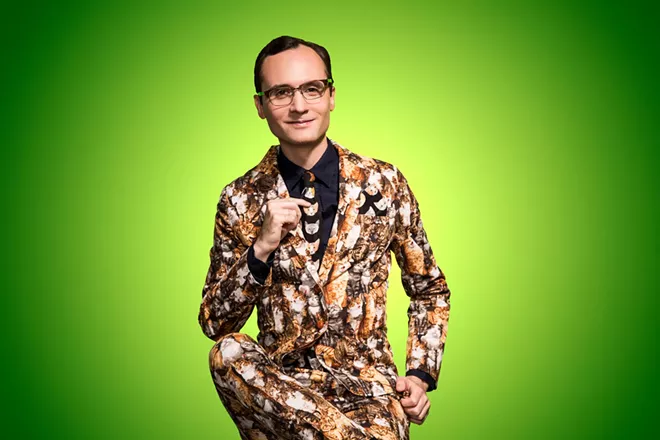A young Joey Clift watched late-night talk shows and The Simpsons almost religiously while living on the Tulalip reservation just north of Everett, and he never saw anyone like himself or his peers on the screen. Since moving from Pullman to Los Angeles in 2010 to pursue a comedy career, he's felt driven to help push Native American voices into the mainstream and showcase the rich history of Native people through comedy.
Most recently, Clift got some national publicity for a Comedy Central animated short he made called How to Cope with Your Team Changing Its Native American Mascot, in which Clift and an all-Native voice cast satirize the complaints of people being told their Tomahawk Chop chants or offensive mascots have to go. The Inlander talked to Clift about his start in comedy, and what's next for the WSU grad.
INLANDER: When did you know comedy was the route for you?
CLIFT: Growing up, I didn't feel like I could work in comedy. I never saw anyone like me on late shows, so I didn't pursue it right out of the gate. I went to a college fair at Everett Community College, and a recruiter from WSU told me that Murrow [College of Communications] had a college TV station, and I was sold from that moment on. So, I transferred to WSU to become a weather guy. I figured, "Hey, these guys can be funny sometimes — they crack jokes." I knew I could make people laugh. I worked on the radio station there, Cable 8 Productions, did stand-up around Pullman, and hosted a bunch of on-campus events. After I graduated, Glenn Johnson [current mayor of Pullman and former professor at Murrow College] pulled me aside and said, "You know you can just do comedy, right?" I had multiple professors tell me that I should just focus on comedy. That's about when I realized I could do this comedy thing.
How did growing up on the Tulalip reservation shape your comedy?
Growing up on the res and going to res schools, again, I didn't see any Native comedians. I didn't even have a sense of what Native comedy was outside of the jokes that funny res folks cracked. Once I was in LA, I didn't start off writing Native-specific comedy because I didn't know how to do it in a way that was funny to me — it just made me sad mostly. I'm a White-passing Native, so I didn't even know if it was my place to write Native comedy, but all of my friends started nudging me toward pursuing it. Along with them urging me to do it, I realized I was one of the only Native comedians getting big opportunities in LA, so I was like, "If I don't write these jokes in these spaces, who else can?" That's when I started to be really vocal about my identity as a member of the Cowlitz tribe.
Once you started being vocal about being Native, what are some of the first projects you worked on?
I worked on a book called The American Indian Ready to Wear Catalog 2018, which was illustrated by my mom and nominated for a book award, and after that I started dreaming up an all-Native comedy show. I pushed the UCB [Upright Citizens Brigade] Theatre to put on a showcase of Native comedians, but I was told by the then-executive director that there was no room for that on the calendar; however there was space for seven nights of some Star Wars show. Once the leadership changed in 2018, I pushed for it again, and we did it. It was a huge moment of me owning my Native identity in comedy. I called it The Ghost of Christopher Columbus Theater Smudging Spectacular, and of course we held it on Columbus Day. It was just 20 hilarious Native comedians who had been fighting for these spots for years. And when that show sold out, it proved that there was a demand for Native comedy. One of the proudest moments of my life. Happy feels like a lower emotion than what I felt in that moment. I never thought it was possible, and it happened. Ultimate wish fulfillment come true.
What about your film My First Native American Boyfriend? Where did the inspiration for that come from?
It's my first live-action short film, and it's currently going through the festival circuit. It's all about the microaggressions that Native people encounter while dating in 2021. The inspiration is that I was dating a non-Native girl, and one night she shook me awake at like 3 am and confessed to me that her mother dressed her up as Pocahontas when she was 5, and she wanted to apologize to me. I just said, "OK? Go back to sleep." She woke me up just for that? I found out that a lot of my Native friends have had similar experiences in interracial dating.
Are there any projects you're working on now that we can start anticipating and get excited for?
Yes! I'm currently working on a Netflix original cartoon show called Spirit Rangers. It's about a Native American family and features an all-Native writers room. That comes to Netflix in 2022. Other than that, I'm just focusing on creating things that help marginalized people feel like they can do what I was afraid to do.♦
For more information about Joey Clift and his latest projects, visit joeyclift.com.

